Jeremie Averous's Blog, page 106
April 28, 2015
Why We Need to Set Boundaries to Practice Compassion
“This research has taught me that if we really want to practice compassion, we have to start by setting boundaries and holding people accountable for their behavior” writes Brene Brown in her book ‘The Gifts of Imperfection’.
 She continues, “Setting boundaries and holding people accountable is a lot more work than shaming and blaming. But it’s also much more effective. Shaming and blaming without accountability is toxic“.
She continues, “Setting boundaries and holding people accountable is a lot more work than shaming and blaming. But it’s also much more effective. Shaming and blaming without accountability is toxic“.
What appears initially as very counter-intuitive gets explained in that last sentence. It also illustrates that real compassion is hard work.
What is really compassion? According to Wikipedia it is ‘the act of going out of your way to help physical, spiritual, or emotional hurts or pains of another’. Doing this movement without setting accountability is certainly toxic for ourselves first, and for the other person in need as well on the longer term. We need to set our boundaries and enforce them.
Next time you feel compassionate, ask yourself where your boundary should be, and hold the other accountable.

April 25, 2015
Why Team Commitment is Better than Any Plan
“The team’s commitment to the plan is key to the successful execution of the plan” writes Clinton Padgett in ‘The Project Success Method‘.
 I’d like to go beyond this – a commitment team is better than any plan, because the plan will change during execution, of course.
I’d like to go beyond this – a commitment team is better than any plan, because the plan will change during execution, of course.
How do we achieve this level of commitment in particular in projects? I have always defended the need to have a series of workshops at the beginning of a project, with the project core team. Not for just having a chat – working together to design an execution plan is the best teambuilding I know. As Clinton Padgett also mentions, “Teamwork builds the team. Fortunately, the processes of defining and planning the project, which take place in the earliest phase of The Project Success Method, are excellent vehicles for team building.” And I can’t agree more.
Do the plan, but do it together. That is more important than the plan itself!

April 23, 2015
Why Playing at Work is Not an Option
Brene Brown in her book ‘The Gifts of Imperfection’ quotes a certain Stuart Brown: “The opposite of play is not work—the opposite of play is depression. Respecting our biologically programmed need for play can transform work. It can bring back excitement and newness to our job“.
 Playing would then be necessary in all corners or our life. How often are we playing in a professional context? Ask yourself – when that happens, how do you feel about the ongoing effort and work, and about the team of people you work with?
Playing would then be necessary in all corners or our life. How often are we playing in a professional context? Ask yourself – when that happens, how do you feel about the ongoing effort and work, and about the team of people you work with?
There are many ways to include some playing even in the most serious of our situations. In any case when you observe some kind of collective depression, you now know the remedy!

April 21, 2015
Why is Deliberate Practice so Powerful?
“This focus on stretching your ability and receiving immediate feedback provides the core of a more universal principle— [deliberate practice] – one that I increasingly came to believe provides the key to successfully acquiring career capital in almost any field” writes Cal Newport’s in his book ‘So Good They Can’t Ignore You’.
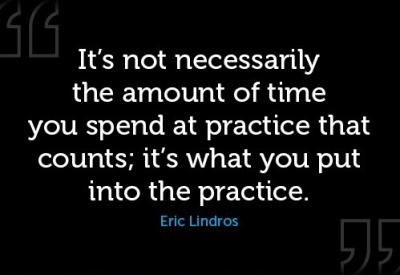 We have already mentioned this concept of deliberate practice in the post where we reviewed the book ‘Talent is overrated’. Practice is not sufficient. It needs to be accompanied by pertinent and frequent feedback and challenge.
We have already mentioned this concept of deliberate practice in the post where we reviewed the book ‘Talent is overrated’. Practice is not sufficient. It needs to be accompanied by pertinent and frequent feedback and challenge.
The psychologist who came with the concept, Ericsson, is quoted as writing “Most individuals who start as active professionals… change their behavior and increase their performance for a limited time until they reach an acceptable level. Beyond this point, however, further improvements appear to be unpredictable and the number of years of work… is a poor predictor of attained performance“.
Practice that is not deliberate will soon lead to a performance plateau. Get frequent feedback and stretch yourself constantly to reach mastery instead.
Now… how can you develop more deliberate practice in the activities you’d like to become great at?

April 18, 2015
Why We Need to Set Limits Before Liberating our Creativity
Many authors state that creativity will be enhanced by accepting limitations, such as for example on a physical limitation on the format, size, number of words, or on the method and means.
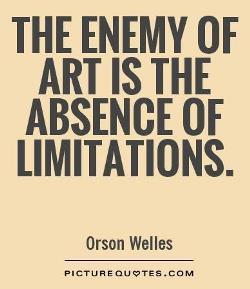 I certainly believe so, because it enables us to focus without having our mind wandering endlessly into the infinite possibilities to express what we need to bring to the world. It also creates a welcome challenge that is more conductive to put us in a state of Flow.
I certainly believe so, because it enables us to focus without having our mind wandering endlessly into the infinite possibilities to express what we need to bring to the world. It also creates a welcome challenge that is more conductive to put us in a state of Flow.
The best artists (which is a denomination I like to use for all of us engaged in creative endeavors) then manage to transcend the self-imposed limitations to create awesome art.
Let us reverse then the statement. It is essential to set a number of limits before we release our creativity. Going further, creative endeavor won’t work before you’ve set these limits. And it is important then not to change the rules of the game in the midst of creation.
If you find that you have difficulties to be creative, maybe you should first review the limitations you’ve set and check whether you should not add a few.

April 16, 2015
Why Failure Should be Inevitable but not Destruction
“Success is most often achieved by those who don’t know that failure is inevitable” is a famous quote by Coco Chanel, recently mentioned by Richard Branson as one of his favorite quotes on failure.
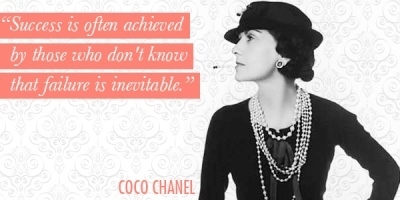 Clearly Coco Chanel was an entrepreneur as well so she must have know what it means to take into look at failure in the eyes, and feel the sting of it.
Clearly Coco Chanel was an entrepreneur as well so she must have know what it means to take into look at failure in the eyes, and feel the sting of it.
It is tough to accept that failure will be inevitable, yet it is the only way to advance.
At the same time, successful entrepreneurs know that leaps of faith must be carefully planned and tested so as not to make the rest of their creation stumble – just as share brokers know that failure (gaining money) is inevitable on part of their portfolio but have a portfolio management process that mitigates these risks.
Failure is inevitable, and it should reflect risk taking and creativity. Destruction is not, it is a matter of careful planning and risk management.

April 14, 2015
How to Get a Great Job and Career
Cal Newport’s advice in his book ‘So Good They Can’t Ignore You’ is quite clear: “if you want a great job, you need to build up rare and valuable skills— which I call career capital— to offer in return“. And it’s not about following your passion!
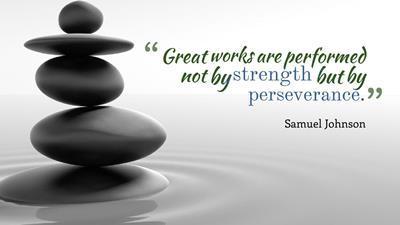 A great job or career would thus be a situation where we can find personal satisfaction by creating great value for the world.
A great job or career would thus be a situation where we can find personal satisfaction by creating great value for the world.
This seems relatively straightforward when pondering: if you want a great occupation with relevant independence and time to create great stuff, you need to have rare and valuable skills that are highly in demand. Hence you can exchange these skills against money – of course -, and most importantly also a large number of non-monetary compensation and advantage. In brief, a high value.
Have you figured out what is really unique and valuable in what you are doing? It might be only a very small part of your occupation at the moment, why don’t you get better at it and make it a linchpin of your professional life?

April 11, 2015
Why There is a Limit in How Much We Can Be in Flow
Flow, as defined by Mihaly Csikszentmihalyi, involves Optimal Experience, when “a person’s body or mind is stretched to its limits in a voluntary effort to accomplish something difficult and worthwhile“. And, according to him, this experience is extremely pleasurable, the basis for happiness – “Enjoyment appears at the boundary between boredom and anxiety, when the challenges are just balanced with the person’s capacity to act”
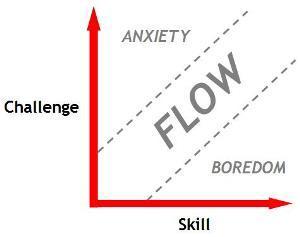 We should thus normally seek to be more often in that state. Most people are never or rarely in Flow, so their problem is to be in that state more often.
We should thus normally seek to be more often in that state. Most people are never or rarely in Flow, so their problem is to be in that state more often.
On the other hand, for those that have found a way to be in Flow often, could we eventually manage to be in that state all the time?
To be in Flow we need to be able to focus our attention on a task that requires a large amount of our internal resources.
In my experience, and also in the experience of other people (for example those involved in creative activities), this state is very pleasurable and also very exhausting, because of the resources it requires. While we should seek to be in Flow often, we can’t sustain it for the entire day. We also need to rest doing more menial tasks, or even lay our mind to rest through meditation or contemplation. Indeed, most writers and creative people are in flow for only a limited number of hours per day, and spend the rest of the time doing daily tasks that do not require much effort.
Nevertheless, the sense of achievement from the moments we have spent in Flow is generally sufficient to make our day.
By all means, seek to be in Flow often, but don’t beat yourself if you can’t sustain that state for more than a limited number of hours per day!
All quotes from Mihaly Csikszentmihalyi’s book ‘Flow: The Psychology of Optimal Experience’.

April 9, 2015
How Mindfulness Is Becoming Mainstream in Organizations
Mindfulness has been in the air for some years, in particular in California start-ups. It even seems that having a meditating practice is kind of a social obligation in the Silicon Valley these days. It has now become mainstream and has noticeably been part of the Davos summit this year, whereas it would have been quite out of question a few years ago.
 A number of interesting papers have been written on the matter, such as ‘At Davos, Rising Stress Spurs Goldie Hawn Meditation Talk’ on Bloomberg, ‘Amid the Chattering of the Global Elite, a Silent Interlude’ in the NY Times. Why them such popularity?
A number of interesting papers have been written on the matter, such as ‘At Davos, Rising Stress Spurs Goldie Hawn Meditation Talk’ on Bloomberg, ‘Amid the Chattering of the Global Elite, a Silent Interlude’ in the NY Times. Why them such popularity?
Of course the boilerplate explanations include: an increasingly stressful world, compounded by smartphone addiction which really does not help putting the mind at rest. People seek a way to unplug even for a few minutes, and some recipe to manage their stress. Some others squarely seek in meditation and mindfulness a competitive advantage.
All these explanations are valid, in particular the need to learn to deal with the much increased amount of solicitations we are subjected to. Deeply I believe it also responds to the need for the individual to increasingly own its actions, and respond rather than react, even inside Industrial Age organizations that were initially designed for individuals to act like cogs in a large machine.
Mindfulness will probably spread further in organizations. We must be careful not to fall in the trendy obligation or just a way to improve well-being in daily work. It must translate into a real change of the organization’s culture.
Let’s start. Just take 5 and breathe!

April 7, 2015
Why a Healthy Company Culture Encourages People to Share Bad News
“A healthy company culture encourages people to share bad news. A company that discusses its problems freely and openly can quickly solve them. A company that covers up its problems frustrates everyone involved” – says Ben Horowitz in his book ‘The Hard Thing About Hard Things’.
 I have observed numerous times how cover-up cultures finally lead to disaster. The role of the leader is essential in that respect. Ben Horowitz continues: “The resulting action item for CEOs: Build a culture that rewards— not punishes— people for getting problems into the open where they can be solved“. In other words, don’t shoot the pianist!
I have observed numerous times how cover-up cultures finally lead to disaster. The role of the leader is essential in that respect. Ben Horowitz continues: “The resulting action item for CEOs: Build a culture that rewards— not punishes— people for getting problems into the open where they can be solved“. In other words, don’t shoot the pianist!
That leadership approach is incompatible with control-and-command styles in particular when terror is part of it. It is easy to find out on what side an organization lies: just listen to people speak about senior management and whether they can be heard when they raise issues.
Of course it is also important to celebrate the good news when they happen. That should not be forgotten either, because the organization should not just look at issues. Some leaders fall in that trap as well.
Still, cover-up is not a sustainable proposal. Candidness is, and I have found over time that it is better to raise issues even if it can lead to being shot in the short term. If your leadership can’t bear bad news and goes up to dismissing you, it might not be worth staying anyway.




